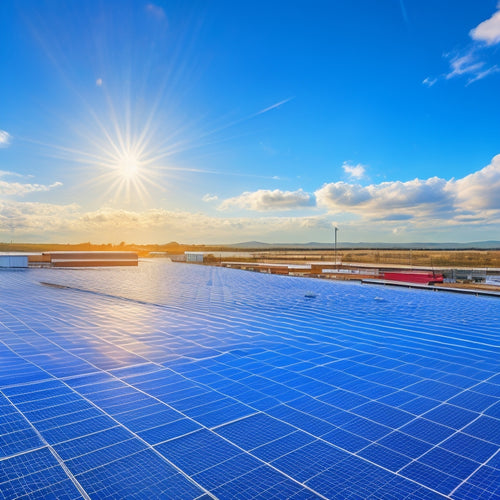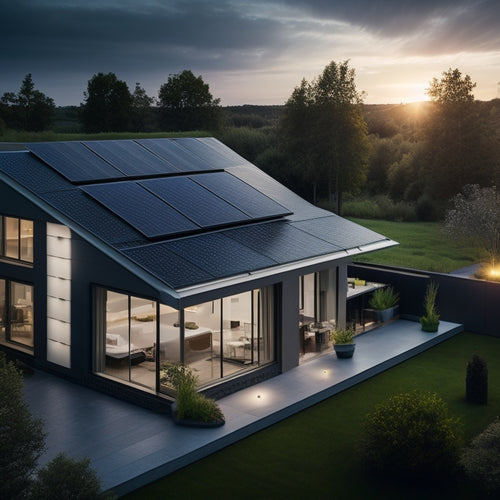
Benefits of Inverter Chargers for Off-Grid Power
Share
Inverter chargers are essential for off-grid power solutions, providing reliable energy during outages and optimizing renewable energy use. These systems seamlessly shift to battery power, ensuring uninterrupted service for your critical appliances. They're more cost-effective than traditional generators, offering higher fuel efficiency and reduced long-term energy expenses. By selecting the right inverter based on your power capacity needs and battery compatibility, you can enhance energy management and minimize waste. With durability spanning up to 15 years, inverter chargers represent a smart investment. Investigate further understanding on how they can change your off-grid energy experience.
At a Glance
- Inverter chargers provide reliable, uninterrupted power supply during outages, ensuring essential functions remain operational in off-grid settings.
- They enhance energy security by integrating renewable sources and optimizing energy use, reducing waste and costs.
- Offering long-term cost savings, inverter chargers reduce energy expenses and promote independence from rising energy prices.
- With a lifespan of 10-15 years, they are durable and require minimal maintenance, reducing replacement frequency.
- Proper power capacity management and battery compatibility ensure efficient operation, supporting various battery types for optimal performance.
Reliable Energy During Outages
When power outages occur, having an uninterrupted power supply is essential for maintaining essential functions in your home or business.
Inverter chargers provide enhanced energy security by seamlessly switching to battery power, ensuring that you're never left without electricity. These systems are especially important in rural areas, where the need for backup solutions is heightened due to frequent power disruptions.
This capability not only protects your devices but also contributes to overall peace of mind during uncertain times.
Uninterrupted Power Supply
An uninterrupted power supply (UPS) is crucial for maintaining reliable energy during outages, especially in off-grid systems. When you're relying on solar integration, a UPS becomes a critical component that guarantees your energy needs are met even when the sun isn't shining.
By seamlessly switching between battery power and solar energy, inverter chargers provide you with the stability and reliability you desire.
To optimize performance, consider some maintenance tips: regularly inspect your battery health, clean connections, and monitor the state of charge. This proactive approach can prevent unexpected downtime and extend the lifespan of your system.
Moreover, a well-maintained UPS can handle sudden power demands, such as starting appliances or powering critical systems during outages. Whether you're working from home or trying to keep essential devices operational, having a UPS guarantees your independence from the grid.
In essence, adopting a UPS in your off-grid setup not only enhances your energy reliability but also gives you the freedom to maintain your lifestyle, regardless of external circumstances.
It's about taking control of your energy future and enjoying the benefits of consistent power supply.
Enhanced Energy Security
Reliable energy security is a fundamental aspect of off-grid living, particularly during outages that can disrupt daily activities. With inverter chargers, you can achieve enhanced energy security by seamlessly integrating renewable sources like solar or wind power into your system. This integration not only stabilizes your energy supply but also promotes energy independence, allowing you to generate and store electricity without relying on traditional grid systems.
When the grid goes down, inverter chargers automatically switch to your stored energy, ensuring that you're never left in the dark. This reliability is critical for maintaining essential functions in your home, from lighting to refrigeration. You gain peace of mind knowing that your power system can respond to outages swiftly and efficiently.
Moreover, inverter chargers optimize the use of renewable energy, maximizing your energy production and minimizing waste. By utilizing smart technology, these chargers monitor energy levels and adjust output accordingly.
This adaptability means you can confidently accept off-grid living, knowing your energy needs are met even during unexpected disruptions. Ultimately, investing in inverter chargers enhances your energy security, giving you the freedom to live sustainably and independently.
Cost-Effective Long-Term Solution
When you consider inverter chargers for off-grid power, you'll likely find they're a cost-effective long-term solution.
These systems not only provide efficient energy conversion but also play an essential role in enhancing energy independence by allowing users to utilize renewable energy effectively.
By markedly reducing energy expenses and providing longevity and durability, these systems can yield substantial savings over time.
Investing in a reliable inverter charger not only enhances your energy independence but also guarantees you won't face frequent replacement costs.
Reduced Energy Expenses
Frequently, homeowners and businesses seeking off-grid power solutions find that inverter chargers offer a cost-effective long-term strategy for reducing energy expenses. By facilitating energy conservation and optimizing your energy consumption, these systems enable you to greatly lower your utility bills.
Inverter chargers efficiently manage the stored energy from your solar integration, ensuring that you maximize the use of renewable energy sources. When you utilize solar power, inverter chargers convert direct current (DC) from your solar panels into alternating current (AC), making it usable for your household or business.
This not only minimizes reliance on traditional energy sources but also mitigates fluctuating energy costs associated with the grid. The intelligent management of energy flow helps you avoid wasting precious resources, ensuring you get the most out of your solar investment.
Moreover, as energy prices continue to rise, the long-term savings from implementing inverter chargers become increasingly apparent. By adopting this technology, you can gain greater control over your energy expenses, creating a path for a sustainable and independent energy future.
Ultimately, with inverter chargers, you're not just investing in equipment; you're investing in your freedom from escalating energy costs.
Longevity and Durability
While many energy solutions may promise short-term gains, inverter chargers stand out for their longevity and durability, making them a cost-effective long-term investment. Their sturdy construction and ability to withstand harsh conditions guarantee that they can deliver reliable power for years to come. By implementing effective maintenance practices, you can further extend the lifespan of your inverter charger, reducing the need for frequent replacements and minimizing waste.
Here's a comparison table that highlights the longevity and durability advantages of inverter chargers:
| Feature | Inverter Chargers |
|---|---|
| Lifespan | 10-15 years |
| Maintenance Needs | Minimal, routine checks |
| Environmental Impact | Low, due to efficiency |
| Replacement Frequency | Every 10-15 years |
| Cost Over Time | Low, due to durability |
Investing in an inverter charger means fewer replacements, minimal maintenance, and a lower environmental impact. This aligns perfectly with your desire for freedom, providing reliable off-grid power without constant worry or expense. Ultimately, the resilience of inverter chargers positions them as an ideal solution for those seeking independence and sustainability in their energy sources.
Key Specifications Overview
When selecting an inverter charger for off-grid power, you'll want to focus on power output capacity and battery compatibility options.
These specifications considerably influence the system's efficiency and your overall energy management.
For instance, choosing the right type of inverter can enhance the stability of your power supply, particularly when dealing with sensitive electronics, as noted in the inverter selection guide.
Understanding these key points helps guarantee that your setup meets your power needs effectively.
Power Output Capacity
Understanding power output capacity is crucial for selecting the right inverter charger for off-grid applications. You need to evaluate how much power you'll require to run your devices efficiently. Inverter chargers come with various output capacities, which directly influences your system's performance and reliability.
Here's a quick overview of key power output specifications:
| Specification | Description |
|---|---|
| Continuous Output | Sustained power available |
| Surge Capacity | Brief peak power allowance |
| Input Voltage Range | Acceptable input voltage |
| Efficiency Rating | Power conversion efficiency |
| Operating Temperature | Temperature range for use |
When considering installation, verify your inverter charger can handle your expected load to avoid overloading. Maintenance tips include regularly checking connections and monitoring the inverter's performance to guarantee it operates at peak efficiency. By understanding these specifications, you can make informed choices, confirming your off-grid system meets your power needs and aligns with your pursuit of freedom. Balancing power output with your specific requirements is key for ideal off-grid living.
Battery Compatibility Options
Battery compatibility options are often a critical factor in guaranteeing your inverter charger operates efficiently and effectively in an off-grid setup. When selecting an inverter charger, you'll want to take into account the various battery types it supports, as these directly influence your system's performance and longevity.
Common battery types include lead-acid, lithium-ion, and gel batteries, each with unique charging requirements and characteristics.
Understanding charging options is equally essential. For instance, some inverter chargers are equipped with multi-stage charging capabilities, which can optimize battery health by adjusting the charge rate according to the battery's state of charge. This feature is particularly beneficial for lead-acid batteries, as it helps prevent sulfation and extends their lifespan.
Moreover, compatibility with smart battery management systems can enhance efficiency, allowing you to monitor battery health and performance remotely.
Confirm you check the specifications of your chosen inverter charger to verify it can handle the battery types and charging options you prefer. By doing so, you'll create a reliable off-grid power system that meets your energy needs and offers the freedom to live independently.
Selecting Based on Power Capacity
When selecting an inverter charger, it's vital to understand your power requirements to guarantee peak performance. This includes knowing the total wattage of appliances and considering future energy needs, as proper load calculations will help you make an informed decision.
Start by calculating your peak load capacity, as this will determine the inverter's ability to handle your highest energy demands. By accurately evaluating these factors, you can choose a unit that meets your off-grid power needs effectively.
Understanding Power Requirements
Selecting the right inverter charger for your off-grid power needs hinges on accurately evaluating your power requirements. To achieve this, you'll want to conduct a thorough load analysis.
Start by listing all the appliances and devices you'll be using, along with their wattage and estimated usage hours. This gives you a clear depiction of your energy needs.
Consider both continuous and surge power demands. Continuous power is what your devices require for regular operation, while surge power accounts for the initial spike when appliances start up. Knowing these figures helps you select an inverter charger that can handle the total load without overloading.
It's also essential to factor in future energy needs. If you plan to expand your off-grid setup, choose an inverter charger with a bit of extra capacity.
This foresight guarantees you won't need to upgrade prematurely, allowing you to maintain your freedom in energy management.
Calculating Peak Load Capacity
Calculating peak load capacity is vital for guaranteeing your inverter charger can handle the demands of your off-grid system.
To begin, you'll need to perform an accurate load estimation, which involves noting all devices you plan to run simultaneously. Consider appliances like refrigerators, lights, and power tools, as each has a specific wattage requirement.
Once you have a detailed list, sum their wattages to determine your total load. Remember that certain devices, especially those with motors, require extra power to start—this is called surge or peak power. This peak demand occurs for just a few seconds, but it's essential in capacity planning.
Next, factor in a safety margin—typically around 20%—to account for unexpected increases in demand or inefficiencies. This guarantees your system can manage brief surges without tripping or damaging equipment.
Higher Efficiency Than Generators
When comparing inverter chargers to traditional generators, you'll notice a significant advantage in fuel consumption.
Inverter chargers convert energy more efficiently, leading to reduced fuel usage for the same output.
This efficiency not only saves you money but also minimizes your environmental impact.
Reduced Fuel Consumption
Compared to traditional generators, inverter chargers greatly reduce fuel consumption, thanks to their higher efficiency rates. When you rely on an inverter charger, you'll notice that it consumes considerably less fuel for the same amount of energy output, which translates to cost savings and less frequent refueling.
This efficiency becomes even more pronounced when you consider solar integration; pairing an inverter charger with solar panels allows you to utilize renewable energy, further diminishing your reliance on fossil fuels.
Additionally, the environmental impact of using inverter chargers is markedly lower. By minimizing fuel consumption, you're not only reducing your operational costs but also your carbon footprint. This aligns perfectly with the desire for freedom in off-grid living, as it enables you to operate independently while being environmentally conscious.
The advanced technology in inverter chargers guarantees that energy generation is optimized, allowing you to enjoy a steady power supply without the unnecessary waste often associated with conventional generators.
As you adopt this modern solution, you're making a choice that not only enhances your energy independence but also contributes positively to the planet.
Frequently Asked Questions
How Do Inverter Chargers Compare to Traditional Battery Systems?
Inverter chargers often show better efficiency comparison than traditional battery systems, converting energy with less waste. However, installation costs can be higher, so assessing upfront expenses against long-term savings is vital for your energy needs.
Can Inverter Chargers Be Used With Solar Energy Systems?
Imagine sunlight pouring into your home; inverter chargers seamlessly integrate with solar energy systems, enhancing solar compatibility and energy efficiency. They convert solar power into usable electricity, enabling you to utilize renewable energy for your freedom.
What Maintenance Is Required for Inverter Chargers?
To maintain inverter chargers, you should regularly check battery health and clean connections. Proper care extends inverter lifespan, ensuring efficient operation. Monitor settings, update firmware, and inspect components to prevent failures and enhance performance over time.
Are Inverter Chargers Portable for Camping or Travel?
Inverter chargers offer portable power, making camping convenience a priority. You'll appreciate their lightweight design and versatility, ensuring you stay energized while exploring the great outdoors without compromising on your freedom and comfort.
How Long Do Inverter Chargers Typically Last?
Inverter chargers typically last 5 to 15 years, depending on performance factors like usage, maintenance, and environmental conditions. Understanding these elements can help you maximize your investment and guarantee reliable power for your excursions.
Explore More
Inverter chargers are like a lifeline in the wilderness of power outages, ensuring you have reliable energy when you need it most. They offer a cost-effective, long-term solution that outperforms traditional generators in efficiency. By understanding key specifications and selecting the right power capacity, you can make an informed choice that suits your off-grid needs. Embracing inverter chargers not only enhances energy independence but also paves the way for a sustainable future.
Related Posts
-

Top Portable Refrigerators for Camping Adventures
When you're camping, having a reliable portable refrigerator can make all the difference for keeping your food fresh ...
-

Commercial Solar Energy
As you consider powering your business with commercial solar energy, you'll uncover it offers a triple benefit: signi...
-

Home Solar Battery
You're opting for a home solar battery that allows you to utilize the power of the sun during the day and use it at n...


